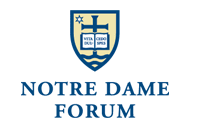
Economist Jeffrey Sachs, director of the UN Millennium Project, medical anthropologist and physician Dr. Paul Farmer, founder of Partners in Health, and Dr. Miriam Laker Opwonya of Uganda will be the featured panelists participating Sept. 14 in the second annual Notre Dame Forum.
TitledThe Global Health Crisis: Forging Solutions, Effecting Change,the forum will take place from 1:15 to 3:15 p.m. in the Universitys Joyce Center arena and will be moderated by Gwen Ifill, senior correspondent for the NewsHour with Jim Lehrer. Classes will be canceled during the forum to give students and faculty the opportunity to attend. A live Webcast will be available at http://forum.nd.edu/ .
The events theme was selected to coincide with the daylong dedication of Notre Dames new Jordan Hall of Science, a $70 million, 200,000-square-foot building that contains the most advanced scientific and educational teaching instrumentation of any university facility in the nation.
More than 50 years ago, the framers of the constitution for the World Health Organization wrote that the highest attainable standard of healthis a fundamental right of all people worldwide,said Rev. John I. Jenkins, C.S.C., Notre Dames president.And yet, despite the many scientific advances in health care over the past half century, poverty, disease and premature death continue to devastate large segments of the world community. As a teaching and research university committed to the ideals of Catholic social justice, Notre Dame takes seriously our responsibility to examine this problem in depth and helpforge solutions.
Notre Dame Forum panelists will discuss the medical, political, moral, social and economic implications of this global crisis, and reflect on the responsibility of developed countries to assist those who suffer from poverty, malnutrition and disease.
Sachs, Farmer and Opwonya have devoted their careers to helping the worlds poorest populations. In addition to his work with the United Nations, Sachs is the Quetelet Professor of Sustainable Development and a professor of health policy and management atColumbiaUniversity, where he also directs The Earth Institute. He is the author of the best-selling bookThe End of Poverty,as well as many other scholarly articles and publications.
As director of the UN Millennium Project and special advisor to UN Secretary-General Kofi Annan, Sachs leads the effort to meet the Millennium Development Goals, the international effort to reduce extreme poverty, disease and hunger by 2015. He has advised governments in Latin America, Eastern Europe, the former Soviet Union, Asia andAfricaon economic reforms and has worked with international agencies to promote poverty reduction, disease control and debt reduction in poor countries.
Farmer has worked in infectious disease control for nearly two decades and is a world-renowned authority on AIDS and tuberculosis. He founded the Boston-based Partners in Health in 1987 as an international organization that provides direct health care services and undertakes research and advocacy activities on behalf of people worldwide who are sick and living in poverty. The organization established a multi-service health complex, Zanmi Lasante, inHaitiin 1991 and is now exporting its community-based model to ruralRwanda.
An attending physician at the Brigham and Womens Hospital inBoston, Farmer also is the Maude and Lillian Presley Professor of Medical Anthropology in the Department of Social Medicine atHarvardMedicalSchool. He is the author or co-author of more than 100 scholarly publications and of numerous books, most recentlyPathologies of Power: Health Human Rights, and the New War on the Poor,published in 2003 by UniversityofCaliforniaPress. He is the subject of the bookMountainsBeyondMountains: The Quest of Dr. Paul Farmer, A Man Who Would Cure the Worldby Pulitzer Prize-winning author Tracy Kidder.
Opwonya is a medical doctor who specializes in tropical medicine and international health issues. She currently works atMulagoHospitalinKampala,Uganda, where she is coordinating a clinical trial involving the use of antiretroviral therapy in the treatment of Kaposis sarcoma, the most common AIDS-related malignancy inAfrica.
A graduate of the London School of Hygiene and Tropical Medicine, Opwonya previously worked on an HIV and AIDS initiative with the U.S. Agency for International Development. She also served at the St. Raphael ofSt.FrancisHospitalinNsambya,Uganda, as a medical officer, the coordinator of palliative care, and in the Department of Paediatrics and Child Health.
Opwonya is a medical columnist for The Leadership, a Catholic monthly magazine inUganda, and is a member of the Board of Governors for thePopeJohnPaulIICollegeinGulu,Uganda.
Also participating in the forum will be two Notre Dame students and two graduates:
- Michael Dewan is a senior science and business major who, while working at a clinic inUganda, contracted malaria. He was able to make a full recovery thanks to his access to first-world medicine, a luxury rarely available to the average Ugandan.
- Ailis Tweed-Kent, a senior engineering major, worked during the summer of 2005 in Mokhotlong,Lesothos, in southernAfrica, ministering to the needs of children, many of them orphans afflicted with HIV/AIDS. Her work was sponsored by The Touching Tiny Lives Foundation, an organization directed in Mokhotlong by 1992 Notre Dame graduate Ken Storen.
- Dr. David Gaus, a 1985 alumnus, is a physician and co-founder of Andean Health&Development Inc., a non-profit agency created as a sustainable model of secondary health care delivery. The program addresses the health needs of morethan 70,000 residents in the poor, tropical region of ruralEcuador.
- Keri Oxley, who was graduated in 2004, is a third-year medical student atYaleUniversityand a member of Notre Dames Board of Trustees. Based on her experiences working in Mother Teresas Home of the Destitute and Dying inIndiaand the Chapin Street Clinic inSouth Bend,Ind., she has decided to specialize in international medicine and medical ethics.
The Notre Dame Forum was established last year by Father Jenkins to annually assemble world leaders on campus in discussion of the leading issues of the day. The forum seeks to engage all campus constituents in these important conversations to better formulate solutions and effect positive change. The 2005 forum addressed the role of religious faith in a plural world.
TopicID: 18922